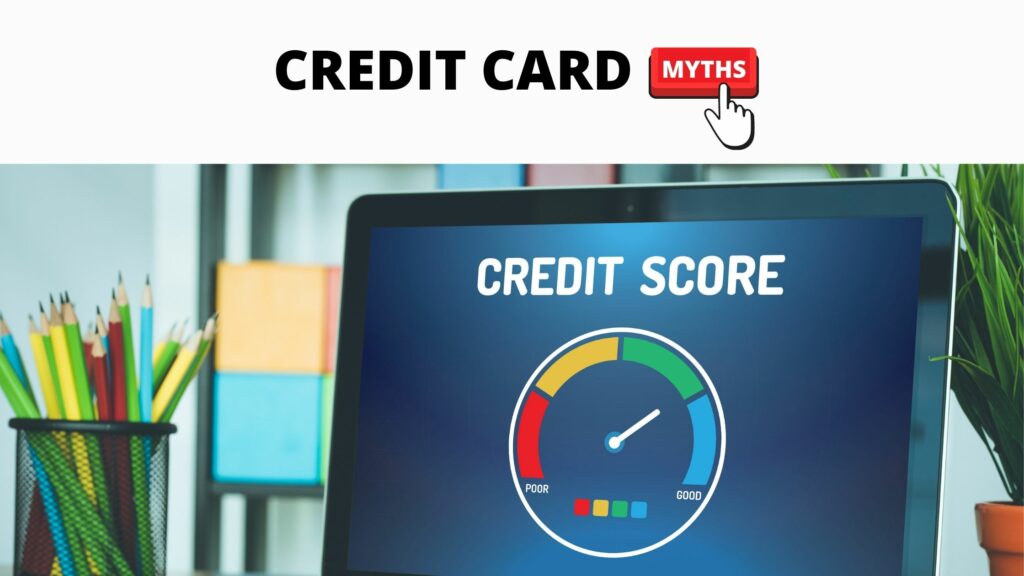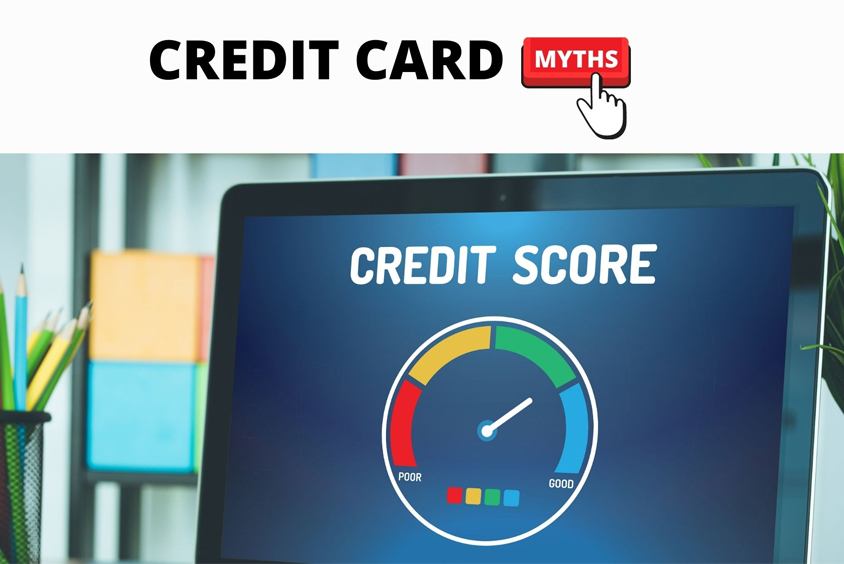Ever thought of why your credit score is not increasing even after keeping all the necessary things in mind? You might be a victim of some common credit card myths. There are a lot of misconceptions about credit cards that people believe in. These can lead you to a negative mindset about having credit cards and can badly affect your credit score as well. We are here to eliminate the seven most common credit card myths from your life to help you establish a better credit score.

Myth 1 – Having A Credit Card Is Not A Good Option
You might have heard several times that having a credit card is not at all good because you can be left with damaging debt by using a credit card. It can even be true for people who don’t actually know how to use a credit card responsibly. But it is not about credit cards, it is about the person because credit cards never request you to take them out and spend some amount on them. It is you who need to decide when and where you should swipe your card. If you know how to manage your expenses, if you understand your responsibilities, having a credit card can give you the best financial stability. It is all up to you how you use your credit card. You may end up having an unmanageable debt or you can build a high credit score.
Myth 2 – Don’t Get Multiple Credit Cards
This too can be the right advice for people who are not responsible enough. But for every other disciplined person, it is always advisable to have multiple credit cards. Spending some amount on different cards is far better than spending all the amount on one as it can affect your credit score. If you use multiple credit cards, you have more credit to spend and hence you can spend some amount on all of them having a good credit-to-debt ratio at the end because this is what really matters.
For example, suppose you have a credit card with a monthly credit limit of Rs. 1 lakh and you spend Rs. 80,000 every month then you are spending 80% of your credit limit, which is not a good idea. On the other hand, you have 3 cards with a credit limit of Rs. 1 lakh each and you spend 30,000 on each of them, then you are spending only 30% of the credit limit on each of the cards, which can help you achieve a really good credit score.
Myth 3 – Carrying A Balance On Your Credit Card Gives You A Better Credit Score
It is one of the most common myths about credit cards that you should never pay the full outstanding balance even if you can. No, that’s not at all true. The outstanding balance on your credit card doesn’t help you in any manner. Carrying a high amount of balance on your credit card month-to-month can be poor for your financial health as well as your credit score. You should always try paying the full amount due on or before the payment due date in order to keep your financial life stable.
Myth 4 – It is Enough To Pay Just The Minimum Amount Due
Although the minimum amount due is the least amount your card issuer expects you to pay every month, it is not necessary nor advisable to pay just that. When you pay only the minimum amount, the remaining amount is added to your next billing cycle along with the interest charges on it. Paying only the minimum amount due doesn’t only affect credit score but it can also leave you with high debt due to the interest charges. So, in order to avoid paying the interest, you must try to pay the full amount due on the billing date or within the grace period. Your credit score is also affected badly if you pay only the minimum amount as your credit-to-debt ratio may be high in such a case.
Myth 5 – Making Everyday Purchases On A Credit Card Doesn’t Work
Many people believe that credit cards should only be used for big purchases and not for everyday purchases like food, clothing, groceries, etc. But, this is not actually true because most of the credit cards earn you rewards or cashback offers on such purchases as shopping, groceries, etc. Even purchasing fuel with your credit card is a good idea as many credit cards come with the fuel surcharge waiver. So, instead of believing that making everyday purchases with a credit card is not good, you should try making all your transactions using credit cards as you can save some percentage of what you spend. Analyze your spend habits & choose credit cards for you that offer exciting rewards on the categories where you spend. Just make sure to spend wisely and you will surely love using credit cards for everyday purchases.
Must Read: Should You Use Credit Cards For Everyday Purchases?
Myth 6 – Closing Unused Credit Card is Beneficial
Most credit cardholders believe that closing an unused credit card is better than keeping it with you. But, this is not always right. There is no harm in keeping a credit card account open even if it is not useful because it can help you build a good credit history. Having more credit card accounts implies having more credit and hence a less credit utilization ratio, which can be beneficial in achieving a higher credit score. Also if closing the old credit card, the average age of your account decreases, which may affect your credit score.
Myth 7 – Checking Credit Report Hurts Your Credit Score
It is also a misconception among credit card users that checking credit reports frequently can affect your credit score in a negative manner. It is just a myth and nothing else. Checking your credit report is treated as a soft inquiry that doesn’t affect your credit score and is instead a good habit to keep an eye on your credit information whether it is accurate or not.
Bottom Line
These are the most common myths about credit cards that lead people to wrong financial decisions. Getting rid of these misconceptions is really important and beneficial at the same time as it can help you build your credit in the right manner. Have you also been a victim of any such myths about credit cards? If yes, do let us know in the comment section below so that other people can get rid of those.









